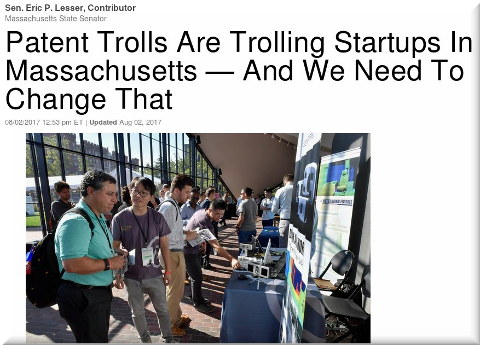

RECOGNITION of the problem is growing. It's growing so fast in fact that judges who are rightly perceived/believed to favour patent trolls were being called out by leading US politicians, who dubbed them "reprehensible". The role played by the patent office is the granting of low-quality patents such as software patents, which patent trolls use almost all the time (some estimates say 70% of the time). This correlation is well documented.
In a recent episode of the HBO series “Silicon Valley,” Richard Hendricks is getting his tech startup off the ground when he comes face to face with a patent troll: an unscrupulous lawyer who claims Richard’s new company is committing copyright infringement.
The lawyer knows his claim is bogus, but also knows Richard would have to pay him in a legal settlement to avoid battling it out in court.
This is not just the stuff of TV fiction. This is real life, and it’s costing billions of dollars in frivolous lawsuits and lost business opportunities.
With an average lawsuit costing $1.6 million, the deceptive actions of patent trolls add up quickly. In 2015 alone, trolls robbed companies of $7.4 billion. One study puts the number much higher, costing companies $29 billion per year.
In a recent episode of HBO’s sitcom “Silicon Valley,” a lawyer tries to extort money from a struggling startup by threatening to sue it for patent infringement. The troll, who understands nothing about the underlying technology, owns a patent so broad as to be unenforceable, but knows that the victims of his perfectly legal extortion scheme lack the financial resources to fight him in court.
A recent research paper by economists Ian Appel, Joan Farre-Mensa and Elena Simintzi shows that the show’s humorous scenario isn't that far from real life. Appel et al. note that patent infringement lawsuits have increased by a factor of 10 since 2000, and that so-called non-practicing entities -- basically, companies that own patents but don’t use them to produce anything -- account for more than two-thirds of the increase. The cases that go to court obviously represent just a fraction of the times that NPEs put pressure on tech companies -- their more typical mode of operation is to send threatening letters. Small businesses are the most common targets. Most of the time, companies cough up the cash, viewing the trolls as merely one more cost of doing business.
[...]
NPEs, or patent trolls, could be one of the forces crushing dynamism in the U.S. A large body of research documents the potential harm that they can do to young, growing companies.
But state governments are fighting back. As of 2016, 32 states had passed laws aimed at limiting NPEs' use of demand letters. Typically, if courts decide a patent holder’s demand letter was unreasonable, it can impose penalties on the person or company making the threats.
Appel et al. study the impact of these laws on small businesses. The results look encouraging. States that adopted these laws saw a 2 percent increase in employment at small, high-tech companies, and a 14 percent increase in the number of companies receiving venture-capital funding. In states with a larger VC presence -- for example, California -- the increase in the number of tech startups was particularly pronounced. Information-technology companies -- just the kind depicted in “Silicon Valley” -- were particularly helped by the laws.